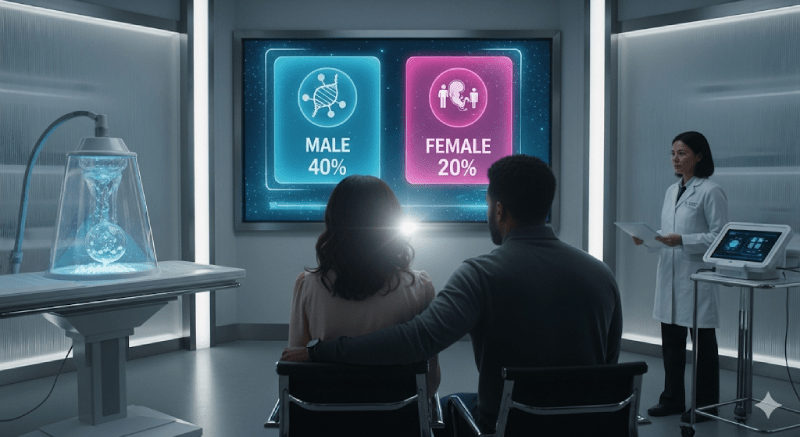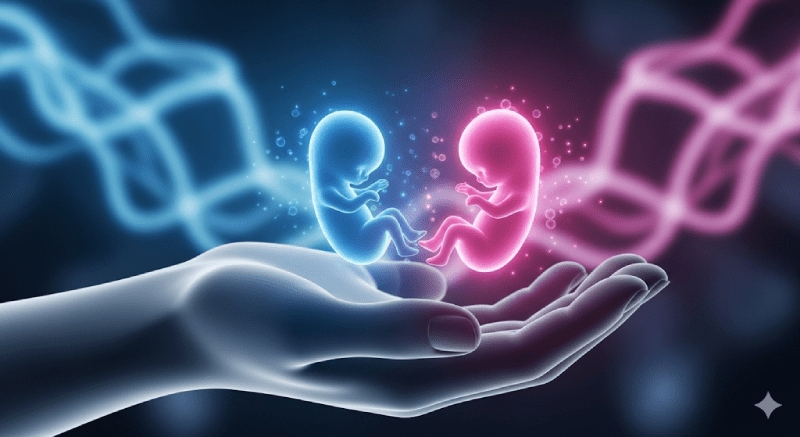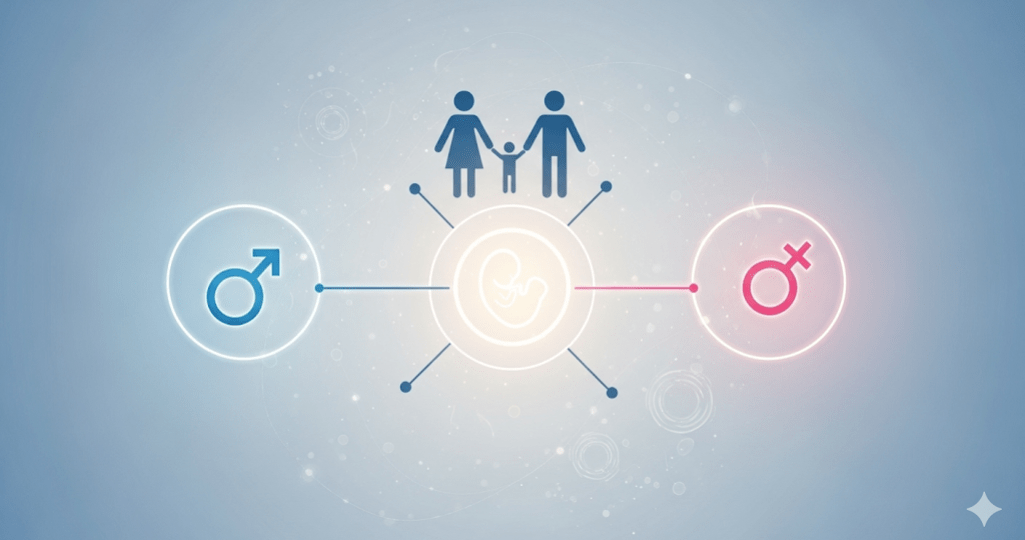Is IVF Gender Selection Legal In Germany
Germany has one of the strictest laws in Europe concerning gender selection. The country’s Embryo Protection Act (Embryonenschutzgesetz – ESchG) strictly prohibits gender determination procedures for non-medical purposes, aiming to prevent the misuse of reproductive medicine. This prohibition covers all forms of PGT (Preimplantation Genetic Testing) for social reasons like family balancing or personal preference. Doctors and healthcare institutions acting contrary to these laws face heavy penal sanctions, including possible jail time. Consequently, the only viable option for couples residing in Germany who desire gender selection for social reasons is to turn to overseas centers where this practice is legally permitted.
What Is The Embryo Protection Act And How Does It Restrict Gender Selection
Germany’s Embryo Protection Act (ESchG) came into force in 1990 and serves as the fundamental legislation regulating the protection of embryos within an ethical and legal framework. This Act mandates the protection of an embryo from the moment it carries developmental potential and limits most interventions performed on a human embryo. Gender selection is strictly prohibited under Article 3 of the Act, except for preventing the transmission of severe genetic diseases. This rigid restriction aims to maintain ethical and social balance by restricting individual preferences regarding the birth of a child, even amidst scientific advancements. Violating the Act can lead to serious fines or imprisonment, underscoring the severity of the regulation.
Under Which Conditions Is PGT Application Permitted In Germany
The application of PGT (Preimplantation Genetic Testing) in Germany was completely prohibited for many years. However, following a court decision in 2011 and subsequent regulations, it is now allowed only in very limited and exceptional circumstances. PGT is permitted exclusively when the couple carries the risk of transmitting a severe hereditary disease (e.g., cystic fibrosis) to the child. Each application is evaluated individually, and approval from a major ethics commission is mandatory. Therefore, the goal of PGT is never primarily gender selection, but the prevention of a genetic disease; gender determination can only occur secondarily when the disease is sex-linked.
Why Is Gender Selection Prohibited Without Medical Necessity
The fundamental reason for prohibiting gender selection without medical necessity stems from the high value the German constitution places on human dignity and the right to life. Lawmakers consider the idea of “designing” embryos solely based on parents’ social or personal preferences to be unethical. This prohibition also aims to prevent the risk of potentially creating social gender imbalances and encouraging discrimination against one gender. Germany accepts interference with the natural course of having children only as an exception justifiable by vital medical grounds.
Is Gender Selection Possible For Family Balancing In Germany
No, it is absolutely not possible and is strictly prohibited to perform gender selection in Germany for the purpose of family balancing. A couple desiring a boy when they already have girls, or vice versa, is not accepted as a medical necessity. According to the ESchG, such social or psychological reasons do not constitute grounds for genetic intervention on an embryo. German fertility specialists are obliged to inform couples about these rigid legal restrictions and warn them against resorting to illegal methods. Consequently, couples seeking family balancing are compelled to seek out overseas centers that legally offer this service.
What Penalties Does The Violation Of The Gender Selection Ban Carry
The violation of the gender selection ban in Germany is subject to severe criminal penalties under the Embryo Protection Act. A doctor or embryologist who violates the Act, meaning performing PGT for gender determination without medical necessity, can be punished with up to three years of imprisonment or a high monetary fine. These sanctions demonstrate the seriousness of the laws and the importance the state places on embryo protection. The penalties target only the professionals carrying out the procedure, indicating that the ban is primarily aimed at controlling the healthcare system. This situation ensures no clinic is willing to take such a substantial risk.
Is Undergoing Gender Selection Overseas Legal For German Citizens
It is generally not a violation of their home country’s laws for a German citizen to undergo gender selection, which is prohibited in their home country, in another country where the procedure is legal. German law does not directly penalize medical procedures carried out outside German territory. However, it is crucial for couples to comply with the legal regulations of the country they are being treated in and to consider ethical boundaries. Seeking support from international consulting services like Cure Holiday for travel arrangements, clinic selection, and legal information in this process is critical for the procedure to proceed smoothly and without complications.
Are Sperm Sorting Methods Used In Germany Instead Of PGT
Even methods of sperm sorting (e.g., MicroSort or the Ericsson method), though less invasive than PGT (Preimplantation Genetic Testing), cannot be used for gender selection purposes in Germany. The strict provisions of the ESchG restrict all attempts to determine gender before initiating a pregnancy. Although sperm sorting methods do not interfere with the embryo, they fall under the scope of the ban if used in artificial insemination (IUI) or IVF procedures because they serve the purpose of gender selection. Consequently, these methods, even with low scientific certainty, are not available in German clinics for social gender selection.
How Do Legal Restrictions Affect German Couples
The strict legal restrictions in Germany profoundly affect couples, especially those desiring family balancing or those with no genetic risk after multiple failed pregnancies. These couples are forced to travel abroad for a specialized procedure like gender selection, even though they can receive high-standard healthcare in their own country. This situation translates to added cost, stress, and prolongation of the treatment process. The restrictions indirectly boost medical tourism from Germany, directing couples to countries where this service is legal, reliable, and provided at a high standard. Cure Holiday offers support for these mandatory overseas trips.
Which European Countries Have More Flexible Gender Selection
In contrast to Germany, gender selection bans are more flexible or partially lifted in some European countries, though this varies from country to country. For example, in Turkey and the Turkish Republic of Northern Cyprus (though not an EU member, geographically close), social gender selection is legally possible with PGT. Other EU countries like Spain, Italy, and Greece generally have strict rules. This situation encourages German couples to turn to centers in Southern Europe or nearby regions that are legal and have high success rates. Cure Holiday is an expert intermediary that understands these legal differences and directs couples to appropriate locations.

Is Ethics Commission Approval Required For PGT Application
Yes, Ethics Commission approval is required on a case-by-case basis for PGT (Preimplantation Genetic Testing) application in Germany. The couple’s application, along with comprehensive medical documentation proving the risk of a severe genetic disease, is submitted to an independent ethics commission. The commission meticulously examines whether the situation meets the exceptional conditions outlined in the ESchG. Gender selection, in very rare cases where the disease is sex-linked, can only be performed as part of PGT with the approval of this commission. This approval is absolutely unattainable for social gender selection.
Is There A Possibility Of The Ban Being Lifted In Germany
The probability of the gender selection ban being completely lifted or PGT being allowed for social reasons in Germany in the near future is highly unlikely. The Act is built upon deep-rooted ethical and constitutional principles, and there is a strong consensus in German society regarding embryo protection. Although some restrictions on PGT have been gradually eased over time (for medical reasons), the social gender selection ban remains protected as a permanent principle within the current legal and ethical framework. Therefore, it is a realistic approach for couples to evaluate overseas options in compliance with existing laws.
What Should Be Considered When Planning Overseas Treatment
Couples planning gender selection treatment abroad must proceed meticulously, especially concerning clinic selection and legal compliance. Key considerations include ensuring the clinic’s gender selection procedure is legal in that country, that the clinic holds international accreditation (like JCI, ISO), and that the PGT laboratory operates at high standards. Additionally, transparency in treatment costs, clarity of contract terms, and receiving support for overcoming the language barrier are essential. Cure Holiday guides couples through this complex process by selecting centers with proven reliability.
How Does Cure Holiday Serve As A Bridge In The Overseas Process
Cure Holiday serves as a reliable bridge to international health centers for couples unable to perform gender selection due to legal restrictions in Germany. They identify clinics where the couple’s desired gender selection procedure is legal, scientifically successful, and adheres to high ethical standards. The services offered include arranging treatment appointments, organizing flights and accommodation, coordinating the treatment plan, and providing translation support during communication with the clinic. This ensures couples can focus solely on their treatment while all logistical and legal details are managed by an expert team.
Is The Gender Selection Ban Important For Societal Gender Balance
The gender selection ban in Germany is of great importance for maintaining societal gender balance. Lawmakers are concerned that widespread gender preferences (e.g., births predominantly of male children) could eventually lead to gender ratio imbalances at the national level and resulting social issues. The Act aims to prevent reproductive technologies from being manipulated in a way that would negatively affect the population structure or societal values. This indicates that the ban is not merely an ethical issue but also a measure aimed at protecting social stability.
How Does The Cost Of PGT Reflect On IVF Treatment
The cost of the PGT (Preimplantation Genetic Testing) procedure significantly increases the total cost of a standard IVF (In Vitro Fertilization) treatment cycle. PGT involves embryo biopsy, genetic analysis, and laboratory procedures, which require high technology and expertise. Since gender selection PGT for social reasons is not performed in Germany, couples incur this additional cost abroad. This cost varies depending on the destination country and the clinic’s pricing policy. Cure Holiday assists couples with budget planning by providing a transparent and detailed budget breakdown for overseas treatment and PGT costs.
What Is The Success Rate Of Gender Selection With PGT
The accuracy rate of gender selection using PGT (Preimplantation Genetic Testing) is technically over 99%. This high accuracy results from the direct genetic analysis of the embryo’s sex chromosomes (X or Y). However, this accuracy rate does not guarantee the success of the embryo implanting and establishing a healthy pregnancy. The success rate of pregnancy depends on factors such as the woman’s age, the overall quality of the embryo, and the clinic’s experience. Guiding couples to centers that perform only accurate genetic analysis under Cure Holiday‘s guidance optimizes this process.
Is Psychological Support Important For Gender Selection
The decision for gender selection can create significant psychological pressure on couples due to ethical dilemmas, expectations, and the necessity of overseas treatment. Receiving psychological support during this process helps couples manage stress, cope with disappointments, and set realistic expectations. The level of anxiety resulting from the travel abroad due to German prohibitions can be mitigated with professional counseling services. Centers collaborating with Cure Holiday generally offer psychological support services to guide couples through this challenging process.
Does The Ban Cover Egg And Sperm Donation
The gender selection ban in Germany, within the scope of the ESchG, covers all interventions made to the embryo. Egg or sperm donation procedures are also subject to the gender selection ban when they are part of an IVF cycle. This means that even on embryos created with material from a donor, gender determination for social purposes cannot be performed. While donation itself is subject to strict rules in Germany, the main prohibition is directed at predetermining and selecting the embryo’s sex.
What Preparations Should Be Made Before Treatment
Before starting gender selection treatment abroad, couples must make comprehensive preparations from both medical and logistical standpoints. Medical preparations include the woman’s hormone tests, ovarian reserve evaluation, and uterine health check; and the man’s current sperm analysis. Logistically, gathering all existing medical records and translating them into English, and completing passport and visa procedures are necessary. Cure Holiday guides couples through all these preparatory steps, facilitating and accelerating the start of the overseas treatment process.

Are Non-PGT Methods Prohibited In Germany
Yes, although performing gender selection with non-PGT methods (e.g., Shettles method, diet, or vaginal pH regulation) is not a direct prohibition of the ESchG, all technologically supported attempts at selection in a clinical setting are strictly prohibited in Germany. Natural methods like Shettles or diet are not considered a legal violation but lack scientific certainty and are not offered by clinics. The main focus of the ban is to prevent the misuse of reproductive medicine for gender preference. This mandates that couples seeking guaranteed results turn to overseas centers where legal PGT is applied.
Do Overseas Clinics Adhere To German Standards
Overseas clinics referred by international consulting firms like Cure Holiday generally offer services that are comparable to, or in some areas more advanced than, German health standards. These centers often possess international accreditations (like JCI), utilize the most up-to-date PGT laboratory technologies, and have high success rates. While some techniques cannot be applied in Germany due to strict ethical and legal restrictions, Cure Holiday‘s selection ensures couples access a treatment environment that is both legal and technologically advanced.
What Is The Effect Of PGT On Embriyo Quality
The PGT (Preimplantation Genetic Testing) procedure itself, when performed with modern techniques and by experienced embryologists, does not negatively impact embryo quality. On the contrary, applications like PGT-A (aneuploidy screening) eliminate genetically abnormal embryos, and only chromosomally healthy embryos are selected for transfer. This increases the potential for the transferred embryo to implant and establish a healthy pregnancy. Therefore, the PGT procedure is also seen as a tool to increase overall IVF success, in addition to gender selection.
What Are The Embryo Storage Procedures After Gender Selection
After gender selection (with PGT), healthy embryos of the sex not selected for transfer are usually frozen and stored. The duration and procedures for embryo storage are subject to the laws of the country where the treatment is performed. While German laws have strict rules for embryos stored on German soil, the legal regulations of the overseas country apply to treatments performed abroad. Couples must obtain detailed information and provide written consent regarding the storage period, costs, and future use or disposal of the frozen embryos through Cure Holiday.
How Are Language Barriers Overcome In Overseas Treatment
The language barrier is one of the biggest challenges couples face in overseas IVF and gender selection treatments. Cure Holiday typically provides medical interpreters or coordinators who speak the couples’ native language to overcome this barrier. These experts ensure communication, appointments, and understanding of medical forms between the clinic staff and the couples. This support allows couples to fully understand their treatment protocols and feel safe and comfortable throughout the process, preventing misunderstandings and errors.
How Should Cost Calculation Be Done In Overseas Treatments
Cost calculation for overseas gender selection treatments should include not only PGT and IVF fees but also additional expenses. The calculation should include airfare, accommodation, medication costs (which can vary by country), interpretation services, and a budget set aside for potential complications. Cure Holiday assists couples with budget planning by providing a transparent and detailed cost breakdown that includes the treatment plan, PGT and gender selection fees, and travel expenses.
What Is The Similarity Of The Gender Selection Ban To Japan And Turkey
The gender selection ban in Germany shows similarity to that in Japan, in that it prohibits social-reasoned gender determination attempts outside of medical necessity. Both countries maintain a strict stance on the ethical limits of reproductive technologies and secure this with Embryo Protection Acts. In contrast, since social-reasoned gender selection is legal in Turkey (and Northern Cyprus), these countries are among the primary destinations favored by German and Japanese couples for medical tourism. This rigidity underscores the importance of Cure Holiday‘s services.
What Factors Increase Pregnancy Success In IVF Treatment
Numerous factors influence pregnancy success in IVF treatment. The most important ones include the woman’s age (higher success at a younger age), embryo quality (especially embryos proven to be genetically normal with PGT), uterine health, and the correctness of the treatment protocol used. Additionally, the clinic’s laboratory standards, the experience of the embryologists, and the couple’s healthy lifestyle factors, such as avoiding smoking/alcohol, directly affect success. Cure Holiday selects clinics with high success rates based on these critical factors.
What Are The Alternatives If Treatment Fails
If IVF treatment or the gender selection transfer fails, couples can evaluate various alternative options. The first step is usually to analyze the reason for the failure (embryo quality, implantation issues, etc.). Alternatives include starting a new IVF cycle, trying a different hormone stimulation protocol, applying PGT (genetic testing) (if not previously done), or considering more advanced reproductive technologies such as egg/sperm donation. Cure Holiday provides support in finding the most suitable new treatment plan for couples after a failure.
What Is The Impact Of The Ban In Germany On Medical Tourism
The strict bans in Germany have significantly increased medical tourism focused on gender selection among German couples. These high-income and health-conscious couples prefer to travel to countries offering legal flexibility to access this service, which they cannot obtain in their home country. This situation creates a significant market, especially for reproductive health centers in countries like Turkey, Cyprus, or the USA. Agencies like Cure Holiday meet this demand, ensuring the safe integration of German couples into the international reproductive health market.
Can Pregnancy Follow-Up Be Done In Germany After Treatment
Couples who undergo gender selection or IVF treatment abroad can have their pregnancy follow-up done seamlessly at a local healthcare facility upon returning to Germany. Pregnancy monitoring is accepted as a standard pregnancy process, and the legality of the overseas procedure does not hinder this follow-up. It is important that all medical records, embryo reports, and genetic diagnosis results obtained from the overseas clinic are organized and legible. These records are critically important for doctors in Germany to fully understand and correctly manage the pregnancy process.
How Are Legal Processes Managed When Traveling Abroad
For couples traveling abroad through Cure Holiday, overcoming legal and logistical barriers is facilitated. Cure Holiday ensures couples understand the gender selection laws of the destination country and the legal forms required by that clinic in advance. They also provide guidance on legal and administrative processes such as visa requirements, international travel restrictions, and understanding treatment contracts. This service allows couples to focus on their treatment and not worry about legal uncertainties.
What Is The Role Of Accreditation In Choosing Overseas Clinics
International accreditations (e.g., JCI or ISO) play a critical role in the selection of overseas reproductive health centers. These accreditations indicate that the clinic complies with global standards in hygiene, safety, laboratory quality, and patient care. Cure Holiday directs German couples to choose from clinics that have these accreditations and provide a quality of service that meets high expectations. This is an important factor that guarantees both the quality of the treatment and the safety of the couples.
What Happens To Healthy Embryos Of The Unwanted Gender
The fate of genetically healthy embryos of the unselected sex after gender selection (with PGT) is one of the most sensitive ethical and legal issues. Since this procedure is prohibited in Germany, this matter is subject to the laws of the overseas centers. Most countries allow these embryos to be frozen and stored based on the couple’s decision. Couples must provide written consent in advance regarding future use, donation, or disposal options. Cure Holiday provides detailed information to help couples make these ethical decisions consciously.
Why Are Communication And Transparency Vital In Treatment
Communication and transparency are vital in complex and ethically sensitive treatment processes like IVF and gender selection. Open communication among the couple, the clinic, and the intermediary agency (e.g., Cure Holiday) eliminates potential misunderstandings, differences in expectations, and legal/ethical uncertainties related to the treatment. Receiving full and accurate information about all procedures, risks, costs, and legal status ensures couples give informed consent and manage the entire process with confidence.

Is There A Possibility Of Error In The PGT Method
The possibility of error in the PGT (Preimplantation Genetic Testing) method is very low but technically not zero. Errors can occur due to situations like mosaic embryos (cells with different genetic structures in the same embryo) or the incorrect analysis of cells in the biopsy sample. However, modern genetic laboratories and technologies (e.g., NGS) have reduced the error rate to below 1%. Cure Holiday collaborates only with international laboratories that use the latest technology and have high experience to minimize the risk of error.
How Does Age Restriction Affect The Gender Selection Ban
While there is no legal upper age limit for IVF treatment in Germany, most clinics restrict treatment to women over 45 based on their own ethical rules due to lower success rates. However, these age restrictions do not affect the gender selection ban. Gender selection, regardless of age, can only be performed as an exception for medical necessities (sex-linked genetic diseases). This shows that the ban is fundamentally based on ethical principles and is independent of the age factor.
How Does Cure Holiday Control The Success Of Referred Clinics
Cure Holiday continuously monitors and controls the success rates and quality of the overseas clinics they refer to. This control is done through regular monitoring of the clinic’s international accreditation status, examination of published clinical success reports, and evaluation of patient feedback. Furthermore, the clinic’s PGT technology and the experience level of its embryologists are used as criteria. This meticulous selection process ensures that German couples receive treatment in centers that are not only legal but also medically the most competent.
What Are The Most Suitable Overseas Routes For Gender Selection
The most suitable overseas routes for gender selection are centers where the procedure is legal, offer high success rates, and provide service close to the standards German couples are accustomed to. These routes frequently include countries like the Turkish Republic of Northern Cyprus, some states in the USA, Thailand, and Mexico like countries. These centers stand out with their advanced PGT laboratories, expert staff, and competitive pricing. Cure Holiday determines the most suitable route based on the couple’s specific needs and budget, providing guidance throughout the process.
Safe Overseas Treatment Steps With Cure Holiday
International solutions are available for couples unable to perform gender selection due to restrictions in Germany. Cure Holiday offers professional guidance throughout this sensitive process, ensuring you reach internationally accredited centers where the procedure is legal and ethical.
With Cure Holiday:
- You fully understand and manage the legal processes and requirements.
- You are directed to world-class clinics using the most advanced PGT technologies.
- All your travel, accommodation, and treatment appointments are professionally planned.
- You receive continuous medical consultation and language support throughout your treatment.
Cure Holiday is ready to guide you with experience and transparency in achieving your desired family balance safely and smoothly.



